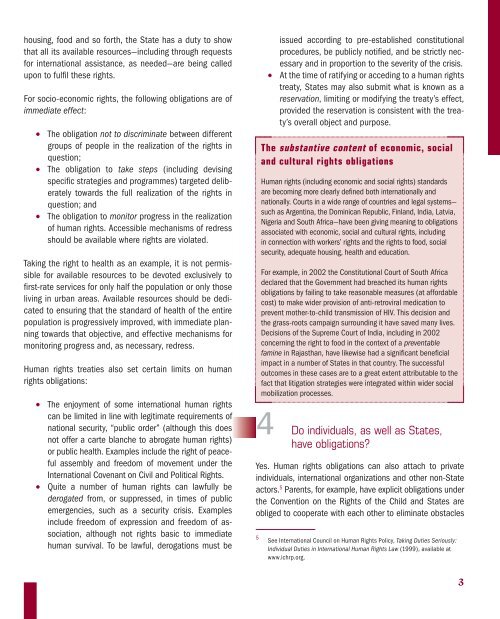Frequently Asked Questions on Human Rights-Based Approach
Frequently Asked Questions on Human Rights-Based Approach
Frequently Asked Questions on Human Rights-Based Approach
- No tags were found...
You also want an ePaper? Increase the reach of your titles
YUMPU automatically turns print PDFs into web optimized ePapers that Google loves.
housing, food and so forth, the State has a duty to showthat all its available resources—including through requestsfor internati<strong>on</strong>al assistance, as needed—are being calledup<strong>on</strong> to fulfil these rights.For socio-ec<strong>on</strong>omic rights, the following obligati<strong>on</strong>s are ofimmediate effect:The obligati<strong>on</strong> nottodiscriminate between differentgroups of people in the realizati<strong>on</strong> of the rights inquesti<strong>on</strong>;The obligati<strong>on</strong> to take steps (including devisingspecific strategies and programmes) targeted deliberatelytowards the full realizati<strong>on</strong> of the rights inquesti<strong>on</strong>; andThe obligati<strong>on</strong> to m<strong>on</strong>itor progress in the realizati<strong>on</strong>of human rights. Accessible mechanisms of redressshould be available where rights are violated.Taking the right to health as an example, it is not permissiblefor available resources to be devoted exclusively tofirst-rate services for <strong>on</strong>ly half the populati<strong>on</strong> or <strong>on</strong>ly thoseliving in urban areas. Available resources should be dedicatedto ensuring that the standard of health of the entirepopulati<strong>on</strong> is progressively improved, with immediate planningtowards that objective, and effective mechanisms form<strong>on</strong>itoring progress and, as necessary, redress.<strong>Human</strong> rights treaties also set certain limits <strong>on</strong> humanrights obligati<strong>on</strong>s:The enjoyment of some internati<strong>on</strong>al human rightscan be limited in line with legitimate requirements ofnati<strong>on</strong>al security, “public order” (although this doesnot offer a carte blanche to abrogate human rights)or public health. Examples include the right of peacefulassembly and freedom of movement under theInternati<strong>on</strong>al Covenant <strong>on</strong> Civil and Political <strong>Rights</strong>.Quite a number of human rights can lawfully bederogated from, or suppressed, in times of publicemergencies, such as a security crisis. Examplesinclude freedom of expressi<strong>on</strong> and freedom of associati<strong>on</strong>,although not rights basic to immediatehuman survival. To be lawful, derogati<strong>on</strong>s must beissued according to pre-established c<strong>on</strong>stituti<strong>on</strong>alprocedures, be publicly notified, and be strictly necessaryand in proporti<strong>on</strong> to the severity of the crisis.At the time of ratifying or acceding to a human rightstreaty, States may also submit what is known as areservati<strong>on</strong>, limiting or modifying the treaty’s effect,provided the reservati<strong>on</strong> is c<strong>on</strong>sistent with the treaty’soverall object and purpose.4 Do individuals, as well as States,have obligati<strong>on</strong>s?Yes. <strong>Human</strong> rights obligati<strong>on</strong>s can also attach to privateindividuals, internati<strong>on</strong>al organizati<strong>on</strong>s and other n<strong>on</strong>-Stateactors. 5 Parents, for example, have explicit obligati<strong>on</strong>s underthe C<strong>on</strong>venti<strong>on</strong> <strong>on</strong> the <strong>Rights</strong> of the Child and States areobliged to cooperate with each other to eliminate obstacles5The substantive c<strong>on</strong>tent of ec<strong>on</strong>omic, socialand cultural rights obligati<strong>on</strong>s<strong>Human</strong> rights (including ec<strong>on</strong>omic and social rights) standardsare becoming more clearly defined both internati<strong>on</strong>ally andnati<strong>on</strong>ally. Courts in a wide range of countries and legal systems—such as Argentina, the Dominican Republic, Finland, India, Latvia,Nigeria and South Africa—have been giving meaning to obligati<strong>on</strong>sassociated with ec<strong>on</strong>omic, social and cultural rights, includingin c<strong>on</strong>necti<strong>on</strong> with workers’ rights and the rights to food, socialsecurity, adequate housing, health and educati<strong>on</strong>.For example, in 2002 the C<strong>on</strong>stituti<strong>on</strong>al Court of South Africadeclared that the Government had breached its human rightsobligati<strong>on</strong>s by failing to take reas<strong>on</strong>able measures (at affordablecost) to make wider provisi<strong>on</strong> of anti-retroviral medicati<strong>on</strong> toprevent mother-to-child transmissi<strong>on</strong> of HIV. This decisi<strong>on</strong> andthe grass-roots campaign surrounding it have saved many lives.Decisi<strong>on</strong>s of the Supreme Court of India, including in 2002c<strong>on</strong>cerning the right to food in the c<strong>on</strong>text of a preventablefamine in Rajasthan, have likewise had a significant beneficialimpact in a number of States in that country. The successfuloutcomes in these cases are to a great extent attributable to thefact that litigati<strong>on</strong> strategies were integrated within wider socialmobilizati<strong>on</strong> processes.See Internati<strong>on</strong>al Council <strong>on</strong> <strong>Human</strong> <strong>Rights</strong> Policy, Taking Duties Seriously:Individual Duties in Internati<strong>on</strong>al <strong>Human</strong> <strong>Rights</strong> Law (1999), available atwww.ichrp.org.3
















